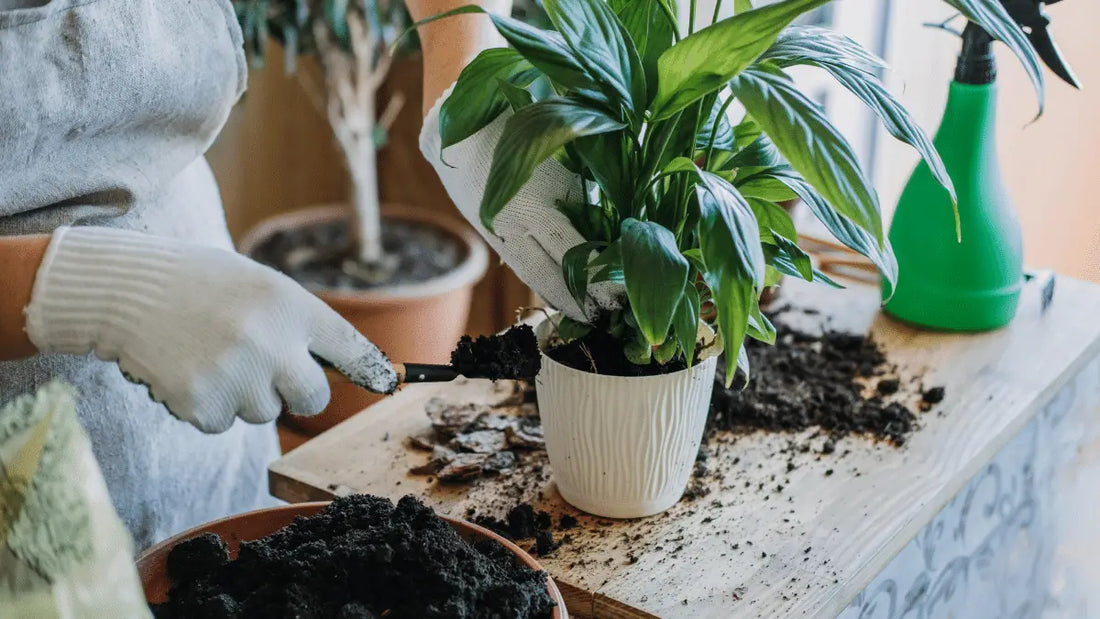More Surprising Benefits of Using Waste Coffee Grounds …. this Time, on Your Houseplants
Our previous blogs have focused on using waste coffee grounds in your garden. But did you know that coffee grounds can also be a great addition to your houseplant care routine?
Houseplants can breathe life and joy into any space, but they require proper care and attention. One way to boost your plant's health is by using waste coffee grounds.
Waste coffee grounds still contain essential nutrients, such as Nitrogen, Potassium and Phosphorous and in lesser amounts, Calcium, Zinc and Copper. All of these are great for your plant's growth and overall health. Nitrogen promotes healthy foliage, phosphorus encourages root growth, and potassium helps in flower and fruit development. By using waste coffee grounds, you can provide these nutrients to your plants in a natural way and support an eco-friendly solution to repurpose coffee waste.
How to Use Waste Coffee Grounds for Your Houseplants
Using coffee grounds for houseplants is easy and simple. Much as in your garden, you can sprinkle coffee grounds on top of the soil around the base of your plants. However, with houseplants, you need to take extra care that this is only a thin layer. Whilst this acts as an effective ‘mulch’ for outdoor plants (holding in water and suppressing weeds), anything too dense will trap water and potentially over saturate the root system of the houseplant. This can lead to poor nutrient uptake and eventually root rot and death.
The best way to introduce coffee grounds, as an organic matter and source of nutrients, is to mix it in with the potting soil. Organic matter improves soil texture, aeration, and drainage, leading to better nutrient absorption by the roots.
If the plant is already established, you can use 1-2 teaspoons of grounds mixed into the first few centimetres of top soil. This should be done every few months. When potting up plants, it is advised to mix the coffee grounds in well with the potting soil. However, the ratio of grounds to potting compost is not determined. Some say use 1/4 cup of grounds to 4 cups of soil. Each plant type is likely to respond to a different ratio- so it’s a case of trial and error. Remember, to boost the top layer of soil every few months, as above, as the nutrients added by the coffee grounds will become depleted over time.
It's important to reiterate that used coffee grounds are near neutral pH. Unlike, fresh grounds that come from virgin beans which tend to be acidic. So, there is no reason why you can’t use waste grounds for most houseplant types.
There are many articles which suggest avoiding coffee grounds for succulents and cacti. Whilst it is true that these plants like minimal watering, I have found that they still love a boost from coffee grounds! In fact, I have mixed specific cacti compost with coffee grounds in near equal ratios and had great results.
Used coffee grounds contain caffeine, albeit in reduced amounts. It is believed that many insects and pests, like slugs and snails, are deterred by this ingredient but also by the aroma and texture of coffee grounds. Moreover, it is said that coffee grounds contain antimicrobial properties that can prevent fungal diseases like root rot and leaf spot.
Another method for using waste coffee grounds is as a natural liquid fertilizer. You can mix coffee grounds with tap water (stir periodically) and let it steep for a few days to make a ‘coffee fertilizer’. Just remember to sieve the liquid before use. Then feed your plants every 7-10 days. Take care not to apply directly onto plant parts. Again, the ratio of coffee to water is not firmly established but some suggest as little as a teaspoon per gallon of water. You can experiment a bit with this to find what works best for your houseplant type. I would suggest making small batches often, in order to keep the natural fertiliser at it’s best.
The above techniques work best with natural coffee that has not been flavoured or contain additives.
In summary, using coffee grounds for houseplants is an eco-friendly and sustainable solution to repurpose coffee waste. Instead of throwing away coffee grounds, you can use them to improve your plant's health and reduce landfill waste. Using coffee grounds for houseplants is a win-win situation. Coffee grounds can enhance soil quality, fight pests and diseases, provide essential nutrients and act as a natural fertilizer.

